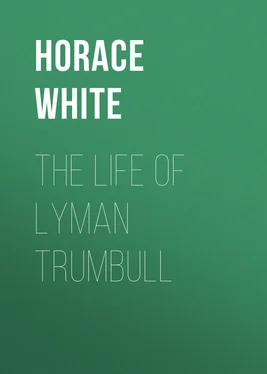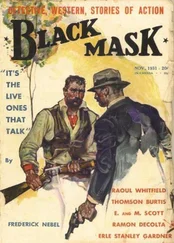Horace White - The Life of Lyman Trumbull
Здесь есть возможность читать онлайн «Horace White - The Life of Lyman Trumbull» — ознакомительный отрывок электронной книги совершенно бесплатно, а после прочтения отрывка купить полную версию. В некоторых случаях можно слушать аудио, скачать через торрент в формате fb2 и присутствует краткое содержание. Жанр: foreign_prose, История, foreign_edu, foreign_antique, на английском языке. Описание произведения, (предисловие) а так же отзывы посетителей доступны на портале библиотеки ЛибКат.
- Название:The Life of Lyman Trumbull
- Автор:
- Жанр:
- Год:неизвестен
- ISBN:нет данных
- Рейтинг книги:5 / 5. Голосов: 1
-
Избранное:Добавить в избранное
- Отзывы:
-
Ваша оценка:
- 100
- 1
- 2
- 3
- 4
- 5
The Life of Lyman Trumbull: краткое содержание, описание и аннотация
Предлагаем к чтению аннотацию, описание, краткое содержание или предисловие (зависит от того, что написал сам автор книги «The Life of Lyman Trumbull»). Если вы не нашли необходимую информацию о книге — напишите в комментариях, мы постараемся отыскать её.
The Life of Lyman Trumbull — читать онлайн ознакомительный отрывок
Ниже представлен текст книги, разбитый по страницам. Система сохранения места последней прочитанной страницы, позволяет с удобством читать онлайн бесплатно книгу «The Life of Lyman Trumbull», без необходимости каждый раз заново искать на чём Вы остановились. Поставьте закладку, и сможете в любой момент перейти на страницу, на которой закончили чтение.
Интервал:
Закладка:
The opinion of a man of high position on the attitude of President Buchanan toward Lecomptonism is found in another letter to Trumbull:
J. D. Caton, chief justice of the supreme court of Illinois, Ottawa, March 6, 1858, does not think all the Presidents and all the Cabinets and all the Congresses and all the supreme courts and all the slaveholders on earth, with all the constitutions that could be drawn, could ever make Kansas a slave state. "No, there has been no such expectation, and I do not believe desire on the part of the present administration to make it a slave state, but as he [Buchanan] had already been pestered to death with it, he resolved to make it a state as soon as possible, and thus being rid of it, let them fight it out as they liked. In this mood the Southern members of the Cabinet found him when the news came of that Lecompton Constitution being framed, and he committed himself, thinking, no doubt, that Douglas would be hot for it and that there would be no general opposition in his own party to it.... You say that the slave trade will be established in every state in the Union in five years if the Democratic party retains power! As Butterfield told the Universalist preacher, who was proving that all men would be saved, 'We hope for better things.'"
CHAPTER VI
THE CAMPAIGN OF 1858 AND THE JOHN BROWN RAID
The events described in the preceding chapter left Senator Douglas still the towering figure in national politics. Although he had contributed but a small part of the votes in the Senate and House by which the Lecompton Bill had been defeated, he had furnished an indispensable part. He had humbled the Buchanan administration. He had delivered Kansas from the grasp of the Border Ruffians. What he might do for freedom in the future, if properly encouraged, loomed large in the imagination of the Eastern Republicans. Greeley, Seward, Banks, Bowles, Burlingame, Henry Wilson, and scores of lesser lights were quoted as desiring to see him returned to the Senate by Republican votes. Some were even willing to support him for the Presidency.
The Republicans of Illinois did not share this enthusiasm. Not only had they fixed upon Lincoln as their choice for Senator, but they felt that they could not trust Douglas. He still said that he cared not whether slavery was voted down or voted up. That was the very thing they did care about. Could they assume that, after being reëlected by their votes and made their standard-bearer, he would be a new man, different from the one he had been before? And if he remained of the same opinions as before, what would become of the Republican party? Who could answer for the demoralizing effects of taking him for a leader? The views of the party leaders in Illinois are set forth at considerable length in letters received by Senator Trumbull, the first one from Lincoln himself:
Bloomington, December 28, 1857.
Hon. Lyman Trumbull,
Dear Sir: What does the New York Tribune mean by its constant eulogizing and admiring and magnifying Douglas? Does it, in this, speak the sentiments of the Republicans at Washington? Have they concluded that the Republican cause generally can be best promoted by sacrificing us here in Illinois? If so, we would like to know it soon; it will save us a great deal of labor to surrender at once.
As yet I have heard of no Republican here going over to Douglas, but if the Tribune continues to din his praises into the ears of its five or ten thousand readers in Illinois, it is more than can be hoped that all will stand firm. I am not complaining, I only wish for a fair understanding. Please write me at Springfield.
Your obt. servant,
A. Lincoln.
C. H. Ray, Chicago, March 9, 1858, protests against any trading with Douglas on the basis of reëlecting him to the Senate by Republican votes. The Republicans of Illinois are unanimous for Lincoln and will not swerve from that purpose. Thinks that Douglas is coming to the Republican camp and that the disposal of him will be a difficult problem unless he will be content with a place in the Cabinet of the next Republican President.
J. K. Dubois, Springfield, April 8, says that Hatch (secretary of state) and himself were in Chicago a few days since. Found every man there firm and true—Judd, Peck, Ray, Scripps, W. H. Brown, etc. Herndon has just come home; says that Wilson, Banks, Greeley, etc., are for returning Douglas to the Senate. "God forbid! Are our friends crazy?"
J. M. Palmer, Carlinville, May 25:
We feel here that we have fought a strenuous and well-maintained battle with Douglas, backed up by the whole strength of the Federal patronage, and have won some prospect of overthrowing him and placing Illinois permanently in the ranks of the party of progress, whether called Republican or by some other name, and now, by a "Wall street operation," Lincoln, to whom we are all under great obligations, and all our men who have borne the heat and burden of the day, are to be kicked to one side and we are to throw up our caps for Judge Douglas, and he very coolly tells us all the time that we are Abolitionists and negro worshipers and that he accepts our votes as a favor to us! Messrs. Greeley, Seward, Burlingame, etc., are presumed to be able to estimate themselves properly, and if they fix only that value on themselves, no one has a right to complain, but if I vote for Douglas under such circumstances, may I be –. I don't swear, but you may fill this blank as you please. Yet I have no personal feelings against Douglas.... Lincoln and his friends were under no obligation to us in that controversy [of 1855]. We had, though but five, refused to vote for him under circumstances that we thought, at the time, furnished good reason for our refusal. We elected an anti-Nebraska Democrat to the Senate, by his aid most magnanimously rendered, and that result placed us, through you, on the highest possible ground in the new party. If you had not been elected, we should have been a baffled faction at the tail of an alien organization. We have, as a consequence, an anti-Nebraska Democrat for governor, and our men are the bone and sinew of the new organization, though we are in a minority. In all these results Lincoln has contributed his efforts and the Whig element have coöperated. For myself, therefore, I am unalterably determined to do all that I can to elect Lincoln to the Senate. I cannot elect him, but I can give him and all his friends conclusive proof that I am animated by honor and good faith, and will stand up for his election until the Republican party, including himself and his personal friends, say we have done enough. Hence no arrangement that looks to the election of Douglas by Republican votes, that does not meet the approval of Lincoln and his friends, can meet my approval.
The chief difficulty was that Douglas had never established for himself a character for stability. People did not know what they could depend upon in dealing with him. Other questions than Lecompton would soon come up, as to which his course would be uncertain. Who could say whether he would look northward or southward for the Presidency two years hence?
Douglas knew that he need not look in either direction unless he could first secure his reëlection to the Senate. Bear-like, tied to a stake, he must fight the course. His campaign against Lincoln for the senatorship does not properly appertain to the Life of Trumbull, although the latter took an active part in it. The author's recollections and memoranda of that campaign were contributed to another publication. 34He recalls with pity the weary but undaunted look, after nearly four months of incessant travel and speaking, of the Little Giant, whose health was already much impaired. A letter from Fessenden to Trumbull, dated November 16, 1856, spoke of him as "a dying man in almost every sense, unless he mends speedily—of which, I take it, there is little hope." In the Senate debates from 1855 on, he often spoke of his bad health, and in one instance he got out of a sick-bed to vote on the Lecompton Bill. The campaign of 1858 was a severe drain on his remaining strength, but in manner and mien he gave no sign of the waste and exhaustion within.
Читать дальшеИнтервал:
Закладка:
Похожие книги на «The Life of Lyman Trumbull»
Представляем Вашему вниманию похожие книги на «The Life of Lyman Trumbull» списком для выбора. Мы отобрали схожую по названию и смыслу литературу в надежде предоставить читателям больше вариантов отыскать новые, интересные, ещё непрочитанные произведения.
Обсуждение, отзывы о книге «The Life of Lyman Trumbull» и просто собственные мнения читателей. Оставьте ваши комментарии, напишите, что Вы думаете о произведении, его смысле или главных героях. Укажите что конкретно понравилось, а что нет, и почему Вы так считаете.












